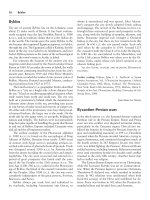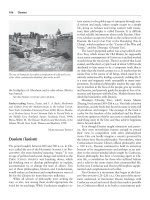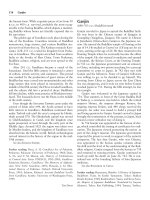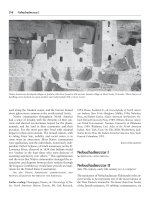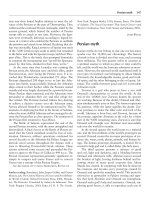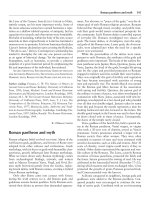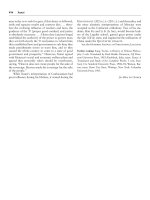Encyclopedia of world history (facts on file library of world history) 7 volume set ( PDFDrive ) 1077
Bạn đang xem bản rút gọn của tài liệu. Xem và tải ngay bản đầy đủ của tài liệu tại đây (96.43 KB, 1 trang )
Yelu Chucai
Yaroslav pursued a very active foreign policy; he
supported and promoted international trade. Russian
merchants successfully traded as far as the Byzantine
Empire, France, Hungary, Norway, and Persia. He
built alliances with several central European and western powers through dynastic marriages, as his daughter Elizabeth was married to Harald III of Norway,
daughter Anna to Henry I of France, and Anastasia to
Andrew I of Hungary. Yaroslav was married to a Swedish princess and his sister married a Byzantine prince.
This cemented the high prestige of the Kievan Rus
state, and Yaroslav’s dynasty in Europe. Yaroslav died
in 1054, respected as a successful builder of the centralized Kievan Rus state. In his will he divided his domain
among his five sons, entrusting the Kievan throne to his
eldest son, Izaslav. However the state was ripped apart
very soon after Yaroslav’s death by his ambitious, but
not farsighted sons.
See also Vikings: Russia.
Further reading: Florinsky, M. T. Russia: A History and Interpretation. New York: MacMillan, 1954; Freeze, Gregory, ed.
Russia: A History. Oxford: Oxford University Press, 2002;
Hosking, G. Russia and the Russians: A History. London:
Allen Lane, 2001; Hrushevsky, Mykhailo, et al. History of
Ukraine-Rus’, From Prehistory to the Eleventh Century. Englewood, NJ: Ukrainian Academic Press, 1997; Kliuchevskii,
V. O. A History of Russia. New York: E.P. Dutton, 1911–
1931; Kocherha, Ivan. Yaroslav the Wise: A Drama in Verse.
Trans. by Walter May. Kiev: Dnipro, 1982; Riasanovsky,
Nicholas V. A History of Russia. Oxford: Oxford University
Press, 2005.
Rafis Abazov
Yelu Chucai
(1189–1243) Chinese statesman
Yelu Chucai belonged to the Yelu clan of the Khitan
Liao dynasty, which ruled northeastern China 916–
1125. After the fall of Liao his branch of the family
remained in northern China and served the Jin (Chin)
dynasty (1115–1234) that had destroyed Liao. He was
thoroughly Sinicized, a follower of Confucian philosophy, and also practiced Buddhism. The Mongol army
captured him in 1215 and three years later he was sent
to Mongolia. He so impressed Genghis Khan in an
interview that Genghis appointed him scribe and court
astrologer; he accompanied Genghis on campaigns to
Central Asia between 1216 and 1219.
435
When Ogotai Khan succeeded his father as grand
khan in 1229, a debate ensued among his advisers on
the general policy directions. The extreme faction advocated the extermination of the agricultural population of
northern China and use of the land for pasturage. Yelu
Chucai argued forcibly in favor of letting the people live
and taxing them, which would generate more revenue
and benefit the imperial treasury in the long run. Ogotai
decided to give Yelu Chucai’s proposal a one-year trial
period. Yelu Chucai devised a plan that assessed every
adult a fixed tribute paid in silk yarn or silver, and every
farming family a set grain tax. This fixed and predictable tax that everyone had to pay was preferable to the
random and ruthless looting up to that time, and for the
Mongol government resulted in increased revenue.
As a result Ogotai appointed Yelu Chucai head of
his secretariat that oversaw the administration for North
China; he would use his position to push for more
reforms. One was to take a census for more accurate tax
assessment. Another was to apply the Jin code for administration of laws for the Chinese population because the
Mongol code was unsuitable for a sedentary culture. In
1238 he was able to hold examinations for the Chinese
population across North China. A quarter of the candidates still had the status of prisoners of war or slaves of
the Mongols. The exams were based on the Confucian
Classics, and over 4,000 men passed. However Ogotai employed few of those who passed and only in very
lowly posts. This was because the Mongol rulers had no
intention of sharing power with their Chinese subjects.
Yelu Chucai also had limited success in his tax reforms
because of Ogotai’s constant demand for more revenue
and orders to increase taxes at will. He turned to a system of tax farming relying on his Central Asian supporters to collect taxes and keeping a portion for themselves.
Central Asians were also favored as moneylenders, who
loaned money to farmers to pay their taxes and charged
over 100 percent per year in interest. Ogotai also created
numerous appanages (fiefs) for his relatives and supporters, who were able to mistreat the people under their
control without government interference. Yelu Chucai
died in 1243 in Karakorum. His great contribution was
to persuade Ogotai not to exterminate the conquered
northern Chinese population. His reforms were largely
put aside in favor of Mongol policy interests.
Further reading: Franke, Herbert, and Denis Sinor, eds. Cambridge History of China, Vol. 6: Alien Regimes and Border
States 907–1368. Cambridge: Cambridge University Press,
1994; de Rachewiltz, Igor, Hok-lam Chan, Hsiao Ch’i-ch’ing,
and Peter W. Geier eds. In the Service of the Khan: Eminent

